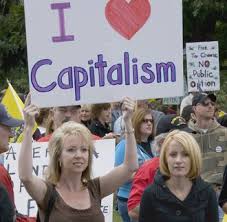The Necessity of Laissez-Faire Economics

The term “laissez-faire” has its roots grounded in the French culture and language therein. It translates to “leave alone” and has been defined as a “hands-off” (regarding government) way of addressing economics – and leadership, for that matter. This (economic) theory became popular in the 18th-century, and promotes the idea that the less the government is involved in free market capitalism, business is proportionally much better off, as is society as a whole as an extension thereof.
Investopedia characterizes free market in regards to economics as a “spontaneous and decentralized order of arrangements through which individuals make economic decisions.”
Typically the government interferes with the economy in one of two ways; the initiation of forceor through socialized industries. The initiation of force is defined as the act of one man initiating force against another, which may be the result of a plethora of unfavorable injustices, including but not limited to murder, theft, and fraud. This type of government involvement is acting against another person without their consent, and is never moral. The socialization of industry relates to the theories of socialism, or a theory or system of social organization that advocates the vesting of the ownership and control of the means of production (factories, mines, transportation corporations, etc.) and distribution of capital, land, etc., in the community as a whole. While certain aspects of socialism may essentially be good in their intentions, as a whole it parallels communism which impedes on the individual’s freedoms to obtain capital and conclusively is not a good thing.
While it is true that every good thing also has its unfavorable counterpart, and even great things cast their shadows, the pros to a laissez-faire system of economics (capitalism) outweigh the cons.
Laissez-faire economics encourages those who are self-motivated to pursue their aspirations to their highest potential, and empowers those who are capable of working independently. Furthermore, it encourages competition between businesses and other organizations, which is beneficial to consumers as they have a multitude of choices regarding products, whether it be the variety or the affordability thereof. LF economics gives citizens the tools they need not only to create an assortment of products to consume but to produce them on the other side of the spectrum. It allows citizens the ability to take initiative to complete tasks on their own, and create things based on their desire to do so as opposed to being coerced or forced. People have the capability to enjoy the freedoms and wealth provided by the society in which they inhabit, laying the groundwork for ample opportunity for success among community members. Moreover, it promotes the creation of wealth, and win-win transactions, in that each member of the trading party benefits.
Regarding economics, the laissez-faire theory emerged circa the 18th century, going hand-in-hand with the Enlightenment. Among other important aspects of human life such as politics and religious freedom, economics needed to change. Mercantilism was the dominant fiscal system, and is defined as the economic theory that trades generates wealth and is stimulated by the accumulation of profitable balances, encouraged by a government by means of protectionism. While some may conceive this as a nice idea having the government’s “protection” when it comes to trade and generating wealth, the fact of the matter is given this economic theory, economic activity benefits the government/state rather than the individual. Laissez-faire provides the perfect counterpart to mercantilism in opposition thereof as it grants everyone economic freedom through competition and no external force. While the laissez-faire theory found its origins hundreds of years ago, it is still relevant in modern society and imperative to the success as well as freedoms of the individuals therein rather than in the wrong hands (the government) and allowing one party too much power.

